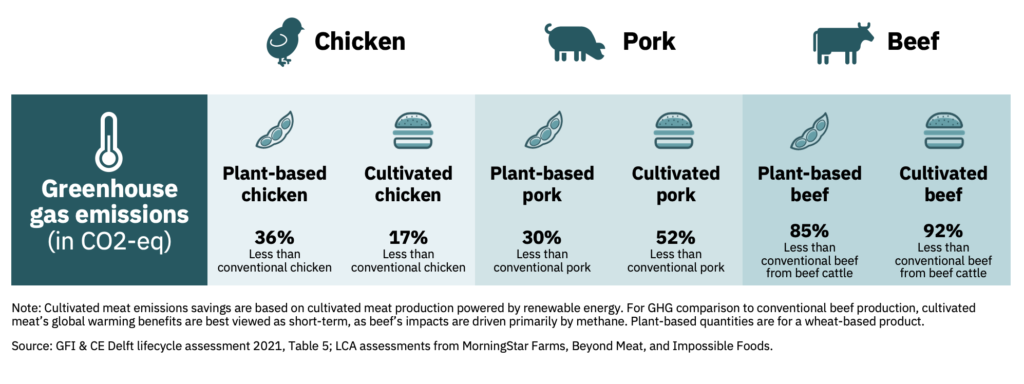IPCC: plant-based and cultivated meat can play critical role in halving global emissions by 2030
5 April 2022
GFI Europe calls for public investment in sustainable proteins as the world’s top scientists recognise plant-based and cultivated meat can cut emissions, and protect nature and global health.

The world’s top scientists have named plant-based and cultivated meat as transformative solutions which can play a critical role in halving global emissions by 2030.
The Intergovernmental Panel on Climate Change’s (IPCC) Sixth Assessment Report takes the panel’s closest look yet at how making meat from plants and cultivating it from cells – alongside transitions in the energy and transport sectors – can significantly reduce emissions.
But the report finds that hard-to-change behaviours such as diets require a transition to more sustainable food sources (section 1.4.7).
The Good Food Institute Europe is now calling on governments to invest in research that makes plant-based and cultivated meat as delicious and affordable as their conventionally produced counterparts, making it easier for consumers to switch to these foods and enabling sustainable proteins to deliver on their climate mitigation potential.
The report states:
- Even if fossil fuels were eliminated overnight, emissions from the food system alone would jeopardise the Paris Agreement target of keeping global temperature rises below 1.5C (12.4.3).
- Although “the greatest shift potential [to mitigate climate change] would come from switching to plant-based diets” (TS. 5.8), growing demand for meat is expected to drive a 14% increase in conventional meat production by 2029 (TS. 5.8).
- Emerging food technologies such as precision fermentation, cultivated meat, and plant-based foods can “promise substantial reductions in direct greenhouse gas emissions from food production” (TS. 5.6.2).
- Citing a paper co-authored by GFI Israel senior scientist Tom Ben-Arye, the report acknowledges that, while in its infancy and reliant on increased investments, innovation, and regulatory approval, cultivated meat offers a more sustainable alternative to current livestock production systems and agricultural land use (7.3.3).
- As well as reducing emissions, sustainable proteins “lower land, water, and nutrient footprints, and address concerns over animal welfare” (TS. 5.6.2). Many other benefits associated with a transition to plant-based and cultivated meat are identified, ranging from decreased risk of zoonotic disease, decreased pesticide and antibiotic use, and decreases in pollutants affecting soil health and air and water quality (TS-91).
Seren Kell, science and technology manager at the Good Food Institute Europe, said: “The latest IPCC report has made clear that nothing short of a rapid transformation of the food system is essential if the world is to avoid catastrophic climate change.
“As global demand for meat continues to grow, the world’s top scientists have recognised plant-based and cultivated meat as part of the solution.
“Particularly in Europe and the global north, where meat consumption remains unsustainably high, governments must invest in these new ways of making meat, which require far less land and water, and cause a fraction of the emissions of conventional meat production.
“Public funding for open-access research is crucial to enable plant-based and cultivated meat to compete with conventional animal products on taste and price, making sustainable choices easy for consumers.
“Time is short to prevent irreversible climate breakdown and species extinction. Changing meat production is a necessary solution that works with existing consumer behaviours, while freeing up land for nature restoration and more sustainable farming practices.”
More on how plant-based and cultivated meat can play a leading role in reducing food system emissions:
- 77% of our agricultural land is used for animal agriculture, which supplies only 18% of the world’s calories. In the face of water scarcity and deforestation, alternatives to animal agriculture can help feed more people while relying on far less land and water.
- According to a report backed by the UK Foreign Office and ClimateWorks Foundation, diversifying the world’s protein supply could result in a 10% reduction in global average crop prices by 2050, while freeing up 640 million hectares of land – an area larger than the Amazon rainforest – creating space for more sustainable farming practices.
- Moving towards plant-based meat would reduce emissions by 30 to 90%, while cultivating meat could cut the climate impact of meat by up to 92%, slashing land use requirements by up to 95% (see chart below).
- Learn more about the intersection between sustainable proteins, climate, and land use in this policy brief by Climate Advisers and the Good Food Institute.

